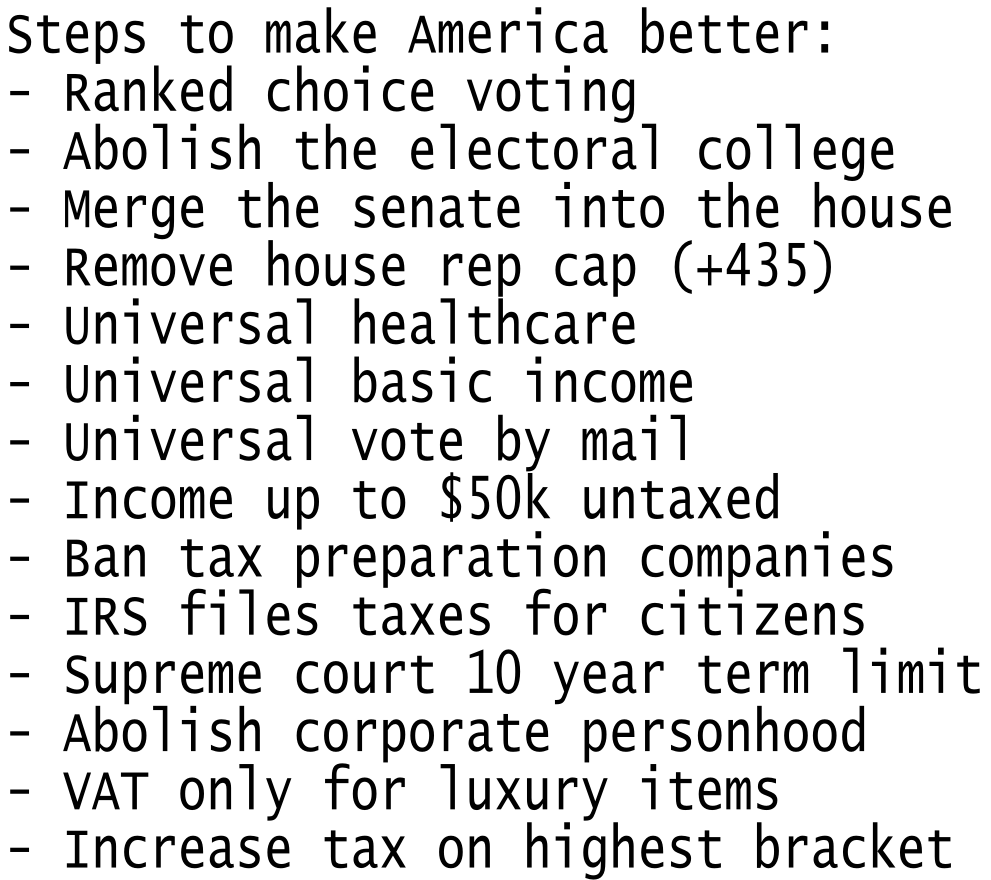this post was submitted on 07 Mar 2024
994 points (91.3% liked)
General Discussion
12084 readers
1 users here now
Welcome to Lemmy.World General!
This is a community for general discussion where you can get your bearings in the fediverse. Discuss topics & ask questions that don't seem to fit in any other community, or don't have an active community yet.
🪆 About Lemmy World
🧭 Finding Communities
Feel free to ask here or over in: [email protected]!
Also keep an eye on:
For more involved tools to find communities to join: check out Lemmyverse!
💬 Additional Discussion Focused Communities:
- [email protected] - Note this is for more serious discussions.
- [email protected] - The opposite of the above, for more laidback chat!
- [email protected] - Into video games? Here's a place to discuss them!
- [email protected] - Watched a movie and wanna talk to others about it? Here's a place to do so!
- [email protected] - Want to talk politics apart from political news? Here's a community for that!
Rules
Remember, Lemmy World rules also apply here.
0. See: Rules for Users.
- No bigotry: including racism, sexism, homophobia, transphobia, or xenophobia.
- Be respectful. Everyone should feel welcome here.
- Be thoughtful and helpful: even with ‘silly’ questions. The world won’t be made better by dismissive comments to others on Lemmy.
- Link posts should include some context/opinion in the body text when the title is unaltered, or be titled to encourage discussion.
- Posts concerning other instances' activity/decisions are better suited to [email protected] or [email protected] communities.
- No Ads/Spamming.
- No NSFW content.
founded 1 year ago
MODERATORS
you are viewing a single comment's thread
view the rest of the comments
view the rest of the comments

Proposing IRV is nice and all, and definitely an improvement (whatever you do don't listen to nutters proposing range voting…it's trivially gameable…and personally I just don't think Approval's lack of ability to give a nuanced vote is very good).
But the real change happens when you move away from single-winner seat entirely. Use something like MMP or STV where the votes can be distributed proportionally.
Australia is a really good example, because we have a bit of both. Look at our House of Representatives. It uses IRV like you propose America switch to. Labor got 33% of the vote and 51% of seats. LNP got 35% of votes and 38% of votes. Greens got 12% of the vote and less than 3% of seats. Yikes. One Nation got almost 5% of votes and 0 seats.
Then look at our Senate. It uses STV so that in a normal election, each state elects 6 Senators and territories elect 1. Labor got 30% of votes and 20% of seats. LNP got 33% and 20%. Greens got 13% and 6%. One Nation, United Australia Party, independent David Pocock, and the Lambie Network each got 1 seat (1.3% of seats) on 4.3%, 3.5%, 0.4%, and 0.2% of votes, respectively. These numbers are obviously not perfect, but they're a hell of a lot better than the Reps' results. STV is a sort of quasi-proportional system, retaining local representation. In our case "local" means "at the state level", but you could also do it by taking 5–12 House of Reps districts and merging them into 1 district, returning 5–12 Representatives.
True proportional systems like MMP (look at NZ and Germany for examples of that in action) or direct proportional systems without a local member (like the Netherlands) get even closer to perfectly matching voters' will.
I broadly agree; if you're in the mood to give more detail about your problems with Approval Voting I'd value that input. It's a topic I have been casually glued to for years, without getting deeper on the analytic side.
That's literally my reason. Approval voting doesn't let you express any preference. If we had approval here in Australia, my vote for Labor would be exactly equal to my vote for the Greens. And I don't want that to be the case. I want my vote for the Greens to be worth more than Labor.
I think approval is likely to hard quite an extreme degree of moderating effect. Some moderation is good, for sure. Compulsory voting has a beneficial moderating effect. But with approval voting, it's likely that the Greens would never win a single seat, even when they're popular enough to win the election under IRV. Because all Greens voters will also approve of Labor, if they vote strategically in an effort to avoid the LNP winning. But some Labor voters might not approve of the Greens even if they would preference the Greens ahead of the LNP.
The other systems I mentioned disliking, "range voting" (one example of which is a system called "STAR") are worse, because they devolve into approval. If you could force everyone to sit down and vote 100% honestly it would be brilliant, but it's just as easy to vote strategically as FPTP is, by voting all maximum or minimum, with no nuance—i.e., approval. Only it's worse than approval, because some people might not recognise this and make their vote weaker by choosing not to vote strategically. Like how people in FPTP voting third party hurts their preferred major party.
Thanks, I think I get it. Proportional representation with 321 seems like something I could advocate for. I'll have to let this marinate for a minute, I've been advocating AV for over a decade now, so I'll need to find quiet time to reflect on it
Careful with the acronym AV! It more often refers to the "alternative vote", which is what they call IRV in the UK.
Gadzooks 😑